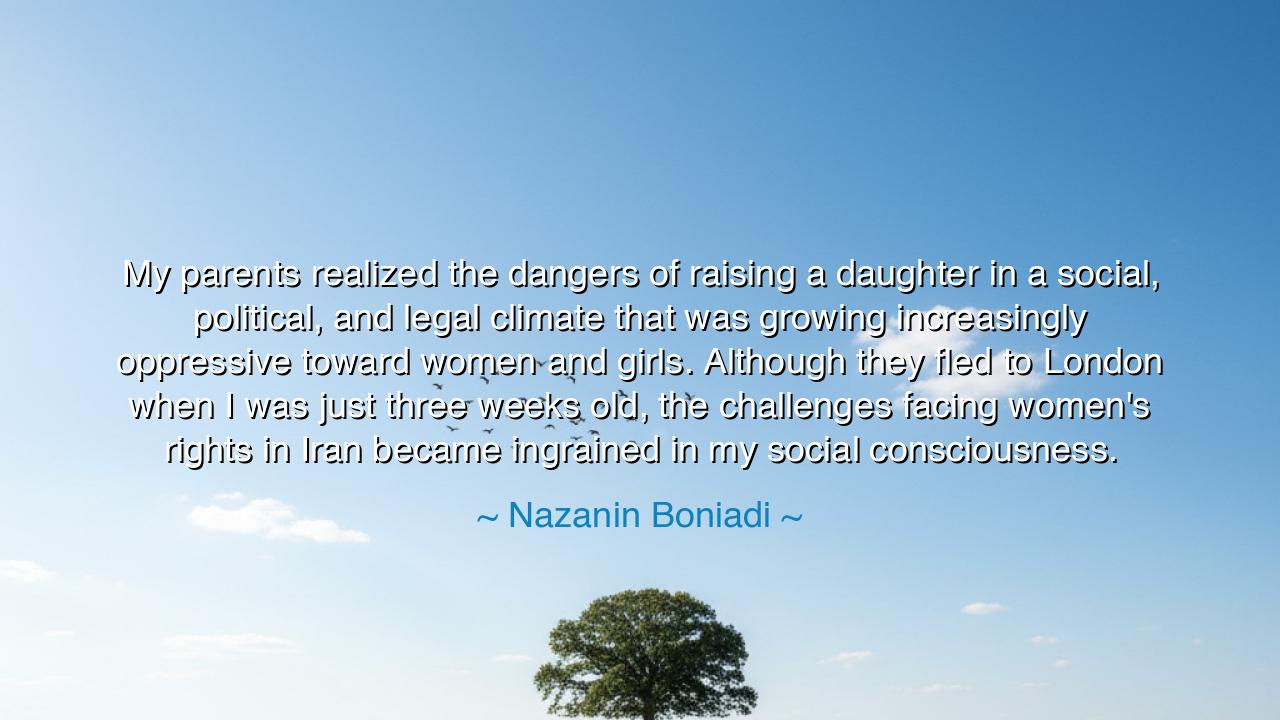
My parents realized the dangers of raising a daughter in a
My parents realized the dangers of raising a daughter in a social, political, and legal climate that was growing increasingly oppressive toward women and girls. Although they fled to London when I was just three weeks old, the challenges facing women's rights in Iran became ingrained in my social consciousness.






The words of Nazanin Boniadi echo with both sorrow and enduring resolve: “My parents realized the dangers of raising a daughter in a social, political, and legal climate that was growing increasingly oppressive toward women and girls. Although they fled to London when I was just three weeks old, the challenges facing women's rights in Iran became ingrained in my social consciousness.” Within this statement lies the eternal struggle of freedom against oppression, and the way awareness of injustice is passed down through generations. Boniadi reminds us that the seeds of consciousness and courage often take root in the earliest experiences, even when those experiences are removed from direct exposure.
The origin of this insight lies in Boniadi’s own life as the child of Iranian parents who fled persecution. Her statement reflects a dual reality: the physical removal from danger and the psychic inheritance of injustice. Though London offered safety, the social, political, and legal constraints on women in Iran left an indelible mark on her upbringing. This awareness — ingrained from infancy — became a foundation for her later activism and advocacy for women’s rights, demonstrating that oppression, though distant, can shape moral and social consciousness profoundly.
From the perspective of the ancients, Boniadi’s words would resonate with the Stoics and moral philosophers who taught that virtue is cultivated through the observation of injustice and the reflection on human suffering. Socrates argued that knowledge of wrongdoing compels action; one cannot ignore the sight of oppression without moral consequence. In the same way, Boniadi’s early consciousness of women’s struggles in Iran instilled a sense of responsibility, a call to witness and eventually to act. Awareness alone becomes the first spark of social justice.
History provides countless examples of such inherited consciousness shaping lives. Consider Malala Yousafzai, who grew up aware of the restrictions placed on girls in her native Pakistan. Even without immediate threat in her earliest years, she internalized the injustices around her, which later fueled her courage to speak publicly for education and women’s rights. Boniadi’s experience mirrors this pattern: early exposure — through familial stories, cultural memory, or legal realities — can plant seeds of lifelong advocacy.
Boniadi’s reflection also underscores the interplay between personal and collective memory. Her parents’ decision to flee was an act of protection, but it also transmitted a profound moral awareness. The social consciousness she developed was inseparable from her identity, shaping her perception of fairness, liberty, and gender equity. In the ancient world, such awareness was considered essential for the cultivation of civic virtue: the child raised in witness of injustice became the citizen prepared to challenge it.
Her words remind us that the fight for women’s rights is both personal and political. Social, political, and legal oppression are not abstract concepts; they manifest in lived experiences, in laws that restrict freedom, and in cultural norms that diminish opportunity. Boniadi’s consciousness of these realities demonstrates how even distance cannot sever one from moral responsibility. The struggle of others becomes part of one’s own ethical landscape, shaping action and purpose.
The lesson is timeless and urgent: awareness of injustice is the precursor to change. One does not need to suffer directly to recognize moral wrongs, nor to act courageously in their pursuit. Boniadi’s statement teaches that early understanding of oppression — whether through family, culture, or observation — can guide a lifetime of advocacy and courage. It is the awareness of injustice that lights the flame of ethical action and societal transformation.
Thus, the wisdom of Nazanin Boniadi endures: protect what is vulnerable, but do not separate yourself from the struggles of the world. Allow awareness to cultivate responsibility, and let the consciousness of past and present injustices inspire action. From even the earliest exposure, one can forge a life dedicated to justice, equality, and the defense of the oppressed, carrying forward the moral lessons inherited from both family and history.






AAdministratorAdministrator
Welcome, honored guests. Please leave a comment, we will respond soon